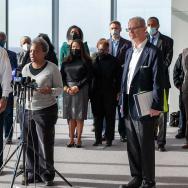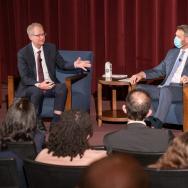Editor’s note: The following message was sent Dec. 10 to members of the University community from President Paul Alivisatos and Provost Ka Yee C. Lee.
As we near the end of the calendar year, we are writing to provide an update on the University’s ongoing work to improve public safety and help strengthen communities in areas on and around our campus and in Chicago more broadly. We have already announced a number of short- and longer-term initiatives to increase security, with input from our campus, the local community and the city of Chicago, and we will continue to adopt additional measures in the coming months. We also know that law enforcement actions are not enough, and we must do more to support the social and economic health of the communities surrounding the university to address the root causes of violence.
Organizations and individuals throughout the South Side are leading economic development activities and innovative approaches with the specific goal of reducing and preventing violence. To date, the University has made extensive investments, in partnership with community members and leaders, in areas such as social service delivery, trauma care and recovery, N-12 education, workforce development, local leadership training, small business development, as well as other programs to help address some of the challenges of urban life. Many of these activities are bolstered by University scholars doing ground-breaking research and programmatic work to strengthen communities.
While these efforts are significant, we know we must do more, and are committed to investing additional resources, and working with city, philanthropic and corporate leaders, to develop an ambitious approach that is commensurate with the pressing challenges.
Informed by ongoing discussions with city and community leaders, University faculty members, students and staff, civic organizations, and the University’s Office of Civic Engagement, we will be expanding investments in research and community-led initiatives to advance strategies for violence reduction. Crucially, we will develop ways for our faculty members and community partners to drive the directions that this work will take.
We are committed to supporting progress on these complex issues, which will require the combined energy and ideas of the University community and our neighbors on the South Side, and we look forward to announcing a number of specific initiatives in January.
The loss of incredibly promising lives to violence, in the University community and in neighborhoods across our city, is a toll we cannot accept. Our collective commitment must honor their memory and help secure a safer future.

